How the Spiritual Exercises prepared men for martyrdom before the Spanish Civil War
Fr Francisco Vallet promoted a five-day form of St Ignatius' Spiritual Exercises amongst Catalan men—thousands of whom later shed their blood for Christ.
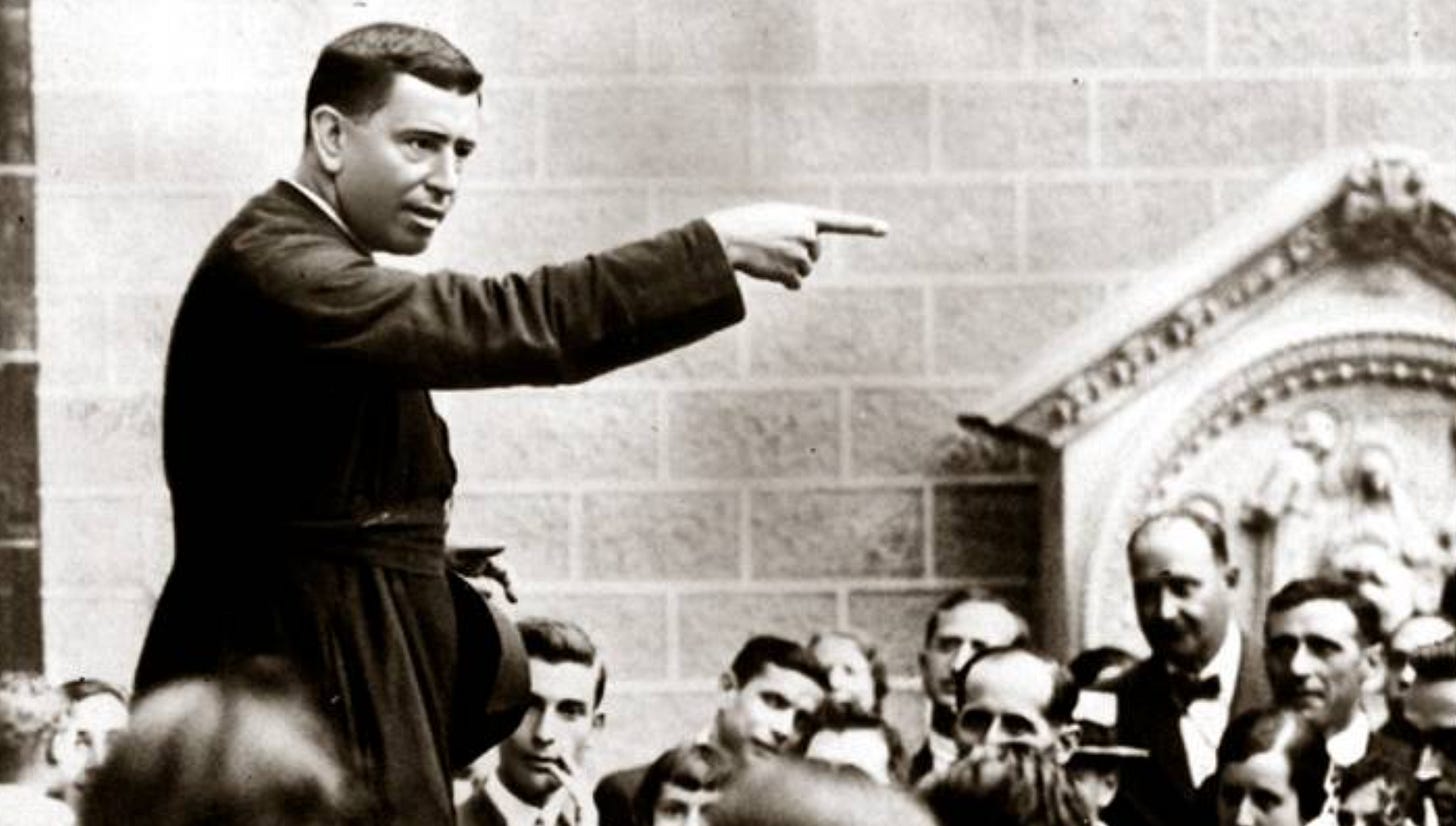
Fr Francisco Vallet promoted a five-day form of St Ignatius' Spiritual Exercises amongst Catalan men—thousands of whom later shed their blood for Christ.
Editor’s Notes
Fr Francisco de Paula Vallet revived the Spiritual Exercises of St Ignatius in a form suitable for the Catholic laity—especially working men—in preparation for spiritual combat and martyrdom. In Catalonia alone, his retreats converted thousands, transformed a formerly anti-Catholic region and prepared it for the ravages of the Spanish Civil War.
It is estimated that from 1923 to 1927, Vallet had given the five-day retreat to 12,643 souls. It is also estimated that 6,000 of Vallet’s former retreatants shed their blood for Christ during the Communist persecution there.
Following the war, the CPCR movement spread across Europe, earning praise from Popes Pius XI and XII. Its legacy lives on today through traditionalist groups such as:
The Society of St Pius X (SSPX)
The Institutum Mater Boni Consilii (IMBC)
The Fraternity of St Peter (FSSP)
The Benedictines of the Abbey of Saint-Joseph de Clairval in Flavigny-sur-Ozerain.
We are informed that the Roman Catholic Institute (RCI) also offers them. In addition, Vallet’s own groups continue in a Novus Ordo setting today.
This present article
The following article, by G.S. Burns, describes the incredible success of Vallet’s apostolate in the Catalan region of Spain. Crucially, it was written before the Spanish Civil War broke out, and before thousands of Vallet’s former retreatants went to their martyrdoms.
And yet even at that time, Burns can see the fruits of the seed sown by Fr Vallet—including in the conversion of many communists and anti-Catholics, who would later die at the hands of their former political allies.
We will explore Fr Vallet’s work in greater depth in due course, but even this article leaves us with an important question.
If the simple five-day form of the Spiritual Exercises could turn Catalonian anti-Catholics into confessors and martyrs, what could they do for us today?
Catalonia for Christ
G.S. Burns
The Month, Vol. CXLIX. April, 1927, 289-299
Headings and some line-breaks added.
Faith in the Streets of Catalonia
They were erecting a new doorway to a building—not an unusual sight, yet my attention was arrested by one of the workmen. He seemed to be enjoying his work! Idly I watch this good Catalan with his corduroy trousers, his curious canvas sandals, worn commonly in this region, his handsome sun-scorched face, his fine physique, as he sat on a scaffolding plank at his task, when suddenly his enjoyment becomes vocal.
Swinging his legs to the rhythm, he breaks into a song. And the song was known to me, at least in words, since schoolboy days—
Salve, Virgo, Salve,
Alleluia, Alleluia.
And he smears the blue-grey mortar, as he sings, over the sunshine-coloured bricks.
But the tune? That too seems strangely familiar. Where had I heard that tune before? Suddenly I recall it to mind.
A Public Demonstration of the Exercises' Power
The scene is now transferred to a big Academic Hall in the College of the Jesuits on the outskirts of Barcelona. The hall is crammed to its utmost capacity—at a rough estimate with five hundred men. The platform is occupied by clerics and laymen, and in the centre of all sits a slight black-robed figure, watching intently, with a smile on his face, the crowd beneath the dais.
It is the General of the Society of Jesus, and the meeting is a popular demonstration, on behalf of these men, to testify their gratitude for having been able to make the Spiritual Exercises of St. Ignatius and to express in public an appreciation of their worth in solving the moral and social evils of the City of Barcelona and the Province of Catalonia.
A man is speaking: a big, large-shouldered man, using pump-handle gestures, it is true, but none the less effective!
“Yes—I have been an anarchist. I confess it here in public. I have known how to use a revolver. But I have been converted. I know now the worthlessness of material things; I don’t want your money, I don’t want to get rich—I want to propagate the knowledge of Christ crucified… and I appeal to the Capitalists to do their duty and learn from Christ their responsibilities to God’s poor…”
A storm of applause drowns his voice. He waits, blinking his eyes at the audience, wipes his mouth on his sleeve and continues… He is followed by a second speaker, a calm, dignified, well-dressed lawyer. As a result of men making the Spiritual Exercises in his parish, Daily Communion has increased by 60 per cent; the birth-rate by 30 per cent. Figures are sometimes eloquent… University students, mechanics, chauffeurs, bakers, tinkers, bricklayers, all classes and conditions of men were present on that occasion, and not a few of them spoke in the same tenor as the speech quoted above.
And then came the outburst of song—their song—the song of that wonderful Retreat organisation which I am about to describe.
“Practise the lessons taught and given to us by His Holiness Leo XIII—the Pope of the Workmen. Be to each other as Brothers, he says. Respect one another’s rights. Be without envy, without suspicion, take pity on the aged and the destitute…”
That is the English prose translation—imagine it set to the Catalan language, put to a ringing air and sung by five hundred men at that motley assembly. And then—
Salve, Virgo, Salve
… sung by those same five hundred, and, no doubt, this bricklayer lad among them.
In far less time than it takes to tell, I recalled all this, and I began speaking to the lad:
“You’ve made the Spiritual Exercises?”
“Si, señor.”
“With Father Vallet?”
“Si.”
“I thought so, by the tune you were singing…”
He grinned and hopped off his perch.
“I’ll sing you another.”
And he did sing it—to the arch-browed astonishment of a passer-by.
The Role of the Spiritual Exercises in the Modern World
I have used this tiny incident to introduce this paper dealing with the work of the Spiritual Exercises in the Province of Catalonia. But I should like, in the first place, to put the particular question of these modern Retreats in Spain into its proper perspective by asking this general question—why and in what precise manner have the Exercises become so important to our generation?
We cannot do better than revive the memory of what the late Father Plater wrote on this subject, particularly in his “Retreats for Workers,” a paper read at the Catholic Congress at Brighton in 1906. He opens by remarking on the changes passing over Europe; everywhere the democratic spirit is gaining strength; everywhere it has resulted in making the working man inaccessible to Christian influences.
The workman is thrown back upon himself, and lives his life apart. He is simply out of touch with all save his own class. He finds himself, in the great industrial centres, thrown together with enormous numbers of those precisely in a position similar to his own… hence it is that the clergy and the educated laity have been called upon with such insistence to go to the people—implying that the conditions of modern society make it difficult, and even impossible, for the people to go to them.
I may at once add that the above can be applied word for word to the social conditions now existing in Barcelona and its environs. True it is that Spain is essentially Catholic, and, moreover, has an agricultural population. Yet the great mass of the industrial population are out of touch with the clergy, and Father Vallet has told the present writer that many men nominally Catholic come to him doubting the most elementary Christian truths.
A background to life—some common bond uniting, despite the discordance of competitive struggle—some worthy object of enthusiasm or devotion behind the aimless passage of the years—some spiritual force or ideal elevated over the shabby sense of temporary failure—this is the imperative need of the masses in our great cities to-day.1
Well, the Spiritual Exercises made in the manner described below supply the two needs emphasised in these two quotations.
Father Vallet’s Solution: Exercises for All
First: “The clergy and the educated laity must go to the people.”
But how? To speak to them from some platform? Visit them under the aegis of some settlement? Patronise them with financial aid? No doubt all these methods have accomplished something in the past, but on the whole they have tended to emphasise class consciousness and class distinctions.
Then “Retreats for working men” you will suggest? No. Not altogether. This label again but serves to perpetuate unnecessary and artificial divisions. Who is the “working man”? A man in overalls and rolled-up sleeves, but not the stiff-collared bank clerk? Previous to the advent of Father Vallet in Barcelona, many Retreats had been advertised as “Retreats for workmen.” Very few workmen had come.
Why? Because they were suspicious; retreat houses founded by the “capitalist class” merely to anaesthetise them with soft religious stuff… thus they argued. Father Vallet has changed the wording; no longer “Retreats for working men,” but “the Spiritual Exercises of St. Ignatius Loyola for ALL.”
And with amazing results. “The educated laity must go to the people.” Under Father Vallet’s system, they not only go but live together with them, sharing the same conditions of comfort and food. This has been the present writer’s privilege—to serve at table at many of these Retreat gatherings. Truly an amazing experience! Tram-car drivers, chauffeurs, university men, lawyers, bank clerks, leisured men of wealth—all gathered together under the same roof and leading for a time the same kind of life.
“Some worthy object of enthusiasm or devotion behind the aimless passage of the years”—this was the “imperative need” outlined by Mr. Masterman. And the Spiritual Exercises, rightly interpreted, supply this need. There is some danger of wrong or inadequate interpretation which misses the thought of St. Ignatius. The aim of the Exercises is not merely the conversion of sinners, or, in general, the correcting of faults and failings in our lives.
To use the current phraseology, the Exercises are not merely psychotherapeutic; we should not enter into a Retreat just with the bare idea of receptiveness to God’s callings. This is something, but not all that is required. There is question of Christian Perfection, involving costly sacrifices and the full appreciation of the highest Gospel ideals.
How Father Vallet reached the population
Now, we would venture to state that just in the proportion as we preach the highest Gospel lessons, just in that proportion do we succeed in giving men “some worthy object of enthusiasm or devotion behind the aimless passage of the years.”
What else can that be—rather, Who else can be a worthy object of our enthusiasm and devotion but the Person of Our Lord Jesus Christ? Any Retreat which fails to put in the clearest possible light the Christian’s main privilege of the possibility of incorporation with Christ—in the manner that St. Paul taught it to converts raw from Paganism—is surely failing in its main object.
We would venture again to state that Father Vallet’s amazing success in Catalonia is due first and foremost to the fact that, in the five days of the Exercises which he gives to his men (they keep complete silence, by the way. This he regards as essential) he follows this thought of St. Ignatius through meditation and meditation. “It is no longer I who give the Exercises, but St. Ignatius through me,” is one of his favourite dictums.
The better to set forth the ideals and methods of this particular Retreat movement, let us consider it under the following heads:
Recruitment
Nature of Retreat
Characteristic Features
Means of Perseverance.
1. Recruitment for the Retreat Movement
First, Recruitment: how are the exercitants got together? I think most people accustomed to the usual methods of advertising a mission or some such apostolic venture here at home would be astounded at the vigorous propaganda carried out in Catalonia. Barcelona is a typical modern seaport, with a busy harbour, factories, tubes, bright shop-fronts and flashing night advertisements. Its chief square is a replica of Piccadilly Circus. Well, in the midst of this chaos of worldliness, here is the sort of religious poster that might easily meet your eye:—
NOT ON BREAD ALONE DOTH MAN LIVE.
(Words of Jesus Christ.)
MEN IN BUSINESS!
This is the truth which throws light on the darkness of our days. Are you aware of it?MERCHANTS!
Your business is not everything—not even the better part of your life. Have you thought about this?WORKMEN!
A life of mere labour for the sake of labour would be sheer debasement. Don’t you feel within you higher and more urgent aspirations?RICH PROPRIETORS!
Have you ever felt the happiness which results from giving to others?POOR MEN—POOR AND RESPECTED!
Here is a true relief as welcome as your daily bread. Do not laugh in bitterness of heart. No. Do not laugh. So far you have known only the consolation of empty words. Try now the real consolation.BEHOLD!
The Apostle and his brethren march past you, preaching and teaching the doctrine of Jesus.
The whole land of Catalonia, its mountains, valleys and plains vibrate with the sound of this doctrine of love.
Yes. It is Father Francis Vallet and his brave company, and they carry with them the greatest wonder of our days—
THE EXERCISES.
Now, you may think this somewhat theatrical, rather Spanish and dramatic. Nevertheless, it is an effective means to a good end. Merchants advertise their goods by every service of human ingenuity; Father Vallet, a merchant in more important goods, adopts their methods. And why not? Advertisement is not necessarily vulgar. It is a means of getting facts known, and it is never so justified as when it is true. It is the exaggerated and misleading advertisement of commerce that tends to degrade a practice which in itself is only reasonable.
Employing, then, methods such as these, the Fathers select a district, comprising, perhaps, a dozen or so parishes, for an intensive campaign, enlist the ready co-operation of the parish priests, and, by the distribution of leaflets of all colours and sizes, posters, articles and announcements in all the leading daily papers, make the Exercises known, at least in theory, to many. The parish priests form small committees of men who have already made the Exercises and together they set about “beating-up” their respective districts. There is no question of compulsion; when they realise what they are, men ask for the Exercises—they feel their need of them.2
Follow public meetings—anywhere and everywhere. In a square, in a cinema, a dance-hall, a café, or the local assembly hall of some political clique. Father Vallet once addressed a packed house in the largest theatre in Barcelona. Challenged to speak in the open, he promptly stood on a table in the busiest of the public squares…
The Mobile Retreat: Bringing the Exercises Anywhere
And so the priests and the laymen’s committee gather their exercitants—say, to the number of fifty. Then follows the first Retreat in that particular locality. If there is an established Retreat House in the near vicinity, well and good. If not, well, here comes the unique feature in this Retreat movement.
It is officially known as a “campaign of the Spiritual Exercises,” and it possesses all the paraphernalia of a military route-march.
Two travelling kitchens, capable of providing for 125 men, vans containing some 80 beds, together with bedclothes, crockery, glasses, knives and forks, etc. Such are the resources at the command of the Fathers. And thus they are able to turn any empty dwelling or hall into a temporary Retreat House.
Father Vallet has, in fact, used schools, hospitals, factories, even an abandoned convent! (I do not think he has quite rivalled Father Martindale, who once gave a Retreat to colliers partly in a church, partly in the priest’s dining-room, partly in a dance hall… But he works along these lines, knowing that if you are determined to have a retreat you can always find a place for it and women-folk to help in the matter of food.)
2. Nature of the Retreat
So much for the procuring of exercitants. Now, as to the kind of retreat, Father Vallet and his colleagues give just the Exercises—with strict silence and real meditation. The five days are not spent in passivity: the mind and the will are constantly employed, stimulated at intervals by the instructions of the Director and by devotional reading. The main substance of the retreat is devoted to what is technically known as the “First Week”:
The Purpose of Creation
Sin
The Reality of Hell and the Means of Escaping it
The Meaning of Redemption
The Person of the Crucified
… It is a robust and virile spiritual diet that is thus administered in the “First Week,” bringing the creature to a sense of all that is involved in creaturehood—the active and direct praise, reverence and service of God seen as the finis primarius of creation…
Characteristic Features of Fr Vallet’s retreats
Several features peculiar to these retreats may now be mentioned. First, “the Banquet of the Prodigal,” which takes place after the general confession on the fourth day. The room is decorated—and the meal is a banquet! Speeches are made, wine drunk, cigars smoked, cakes cut… These men had, perhaps, come despondent, unsettled, unhappy.
Why? Because life had had for them no clear goal; there had been no “worthy object of enthusiasm or devotion behind the aimless passage of the years”; but now these four days of intensive effort had succeeded in clarifying their minds, strengthening their wills—and they had realized, perhaps for the first time, Jesus Christ.
It is on the occasion of this banquet that each man receives the little souvenir card which, I think, is so unique. On the front, a picture of St. Ignatius in the cave at Manresa; inside, the printed names, parishes, and professions of all who attended that particular retreat; on the back, a few maxims from the Exercises and the Baptismal vows. The ceremonies surrounding the renewal of these latter form another characteristic of these Spanish retreats.
On the morning of the sixth day, the men march in procession from the retreat-house to the parish church behind a huge Crucifix. The present writer once walked in one of these processions when the Crucifix was life-size, with long “real” hair on the head and gorgeous raiment glittering in the sun; enormous wax candles were borne; hymns sung, then and in the church, packed with men. After a multitude of Communions came the public recital of the Baptismal vows.
Never shall we forget the scene… “Take unto thee the faith of the heavenly precepts, and in thy way of life be such that thou mayest forthwith be God’s Temple.” There was no mistaking the earnestness of the response. These men had become children again in their sheer joy at the possession of the Faith, whose vitality had, perhaps, remained buried for many a long year beneath the dust of a false materialism.
Means of ‘Perseverance’
But faith revived can die again. No experience in the spiritual life is commoner than the cooling of fervour.
What is done to maintain the fruits of the Exercises by these experienced guides of souls? The necessity of some sort of organised co-operation to secure perseverance in good has long been recognized.3
Father Vallet considers that the unit of all such organisation must be the parish, where each one has had all his spiritual experiences, and which should come first in his spiritual affections.
A Growing Movement Across Catalonia
All this region of Catalonia, accordingly, is mapped out in the following way both for “recruiting” and for maintaining the effects of the retreats. First, some prominent town is chosen as the “Capital for a campaign.” From there, as headquarters, all the surrounding country is evangelised.
Secondly, a parish from which more than a dozen men have made the Exercises can form its “League of Perseverance.” If it especially distinguishes itself in apostolic work, it receives the League Flag.
Thirdly, parishes which fall short of that number of exercitants can become Delegations or sub-Delegations as the case may be, and are affiliated through elected representatives to the nearest parish that has a League.
There is a Central Committee, with a kind of “Club-house” in Barcelona. Each Parish League is governed by its parish priest and committee of laymen. There is as much inter-parochial communication as is possible. An efficacious bond of union is an excellent monthly periodical devoted to the work of the Exercises entitled “Perseverance.”
It is no ordinary parochial work which we describe: no mere devotional practice for the edification of the masses; it is the elevating into a spiritualised organisation of the shapeless, hopeless, toiling mass of humanity; it is the transformation, under seemingly desperate conditions and in an incredibly short space of time, of thousands of indifferent, disaffected, or even irreligious workmen into veritable apostles—centres of light and strength to their fellows.
These words of Father Plater, written twenty years ago, might describe the effects of the Catalonian retreat movement. And naturally enough, the creation in each parish of a body of keen and zealous men of this kind, ready to rally round their pastor on any occasion, and to kindle into new life already existing organisations, meets the approval of the Supreme Authority. The Holy Father, two years ago, asked a group of cardinals what they thought was the most needed human institution nowadays in the Church—and he answered his own question: “A group of really instructed laymen in each parish.”4
And so it has actually come about that in about 500 parishes from nine dioceses, groups of men have sprung up, inspired with the enthusiasm which the Faith properly grasped supplies, and the people have rallied round their priests!
An all-round improvement in the spiritual life of the parish has been the natural result; Sodalities and Vincent de Paul Conferences are re-invigorated; the observance of Sunday has improved, blasphemy has been checked, and frequent reunions keep the idea of Perseverance alive. We hear, too, of Father Vallet’s further schemes for establishing study clubs on the lines of our own C.S.G.
Pilgrimages and Catholic Identity
Of more general interest, yet tending to maintain connection in the Exercises, are the mass pilgrimages to Montserrat, organised by Father Vallet on March 25th of each year.
It was to this Catalonian shrine of Our Lady that Ignatius came, on the eve of the Annunciation—March 24th, 1522—to make his ever-memorable vigil and dedicate his life to God. Spanish devotion to this shrine, high up amongst those saw-toothed mountain crags, has flourished unabated to this day.
Thither, then, these men of Father Vallet assemble to hold their retreat mass meetings, with a midnight Mass on the night of the 25th.
The numbers attending call for much organisation: decorated trains, and then charabancs convey the marshalled multitudes, and all goes smoothly, thanks to the energy of Father Vallet, who knows so well how to combine the “business” with the “dream.”5
The measurable success of the retreats
I would conclude with a few statistics to justify the title I have given to this paper. This work has now been in progress for four years.
During the years 1923 and 1924, 2,697 men made these five-day Retreats.
In the year 1925, 2,586 men.
In the year 1926, 3,064 men.
The total for four years is 8,341 men.
Now, considering that for the greater part of the time, only two priests have been at the work, this, on examination, will be shown to be an immense achievement. On average, it works out at about 40 men a week—week in and week out without interruption for four years. Last year’s monthly average was 268.
Taken in conjunction with all the organisations outlined above, the work bears all the signs of permanency; the secular clergy are enthusiastic in its support; Religious Orders have rivalled each other in assisting. Father Vallet’s methods have been studied and put into operation elsewhere by not a few. Moreover, he has had men in his Exercises who have really corresponded to St. Ignatius’ idea of the formation of leaders; eminent and wealthy men on the one hand, and real converts from red-hot anarchy on the other.
There is no doubt that Barcelona, once in the days of Ferrer a focus of anti-Christian propaganda, is a changed city; in part, this is due to the strength of the new political régime, but those who know will tell you that a really appreciable transformation in the life of the people has been brought about by the practice of Retreats.
The Deeper Lesson of the Exercises
Here then is a matter for “social reformers” to ponder over. It is time that they realised that the complex social problem—the relationship of capital to labour—is not a mere external readjustment of burdens and profits, still less, of State ownership. There is need of a higher ideal than material prosperity if men are to work in harmony. The higher ideal alone can effectually oppose the natural selfishness of the individual, and it is by recognising our true position in God’s scheme of things that we get sight of that ideal. Rights we have and must maintain, but we have duties too, the chief of which is to love and serve God and, for His sake, our neighbour made in His likeness.
To realise these truths we need to think, and we cannot think (much less pray) in the whirl and turmoil of the world. Hence the function of Retreats. But we need to put order into our thoughts: hence the value of the Spiritual Exercises of St. Ignatius.
“Some worthy object of enthusiasm and devotion behind the aimless passage of the years.” Who will wonder at that young Catalan bricklayer singing at his work and singing the praises of the Lady who brought the Son of God into that world which, apart from Him, is a valley of tears?
G. S. BURNS.
Read Next:
Can’t make a retreat? Check out this introduction to some of the ideas of the Spiritual Exercises for your family:
The history of the Ignatian retreat
HELP KEEP THE WM REVIEW ONLINE WITH WM+!
As we expand The WM Review we would like to keep providing free articles for everyone.
Our work takes a lot of time and effort to produce. If you have benefitted from it please do consider supporting us financially.
A subscription gets you access to our exclusive WM+ material, and helps ensure that we can keep writing and sharing free material for all.
(We make our WM+ material freely available to clergy, priests and seminarians upon request. Please subscribe and reply to the email if this applies to you.)
Subscribe to WM+ now to make sure you always receive our material. Thank you!
Follow on Twitter, YouTube and Telegram:
Fair Use Rationale for images above: They are historically significant; they are being used for informational and educational purposes; they are readily available on the internet; they used by many other sites; they are low resolution copy of the original; they are unsuitable for commercial use.
If someone owns the copyright to this material and would like us to remove it, or does not agree that our use is “fair use”, then please contact us at editor [at] wmreview [dot] co [dot] uk.
C.F. Masterman, in The Heart of the Empire, 1901
“The one thing is, that both clergy and laity should feel convinced of the value of a retreat. The retreat-house must not need to call for men to come to it; the various groups must so value a retreat that they are rivals for precedence! Once a parish has got accustomed to retreats, the men will entrust their organisation to ‘promoters’ from among themselves.” C. C. Martindale, S.J., in The Messenger, July, 1924.
Cf. Retraites Fermées, Pratique et Théorie, Paris, Beauchesne, 1920. Also No. 21 of Fr. Watrigant’s Collection de la Bibliothèque des Exercises. For Holland, Fr. Charles Sudbrack, passim. For Italy, Resoconto dei Retiri Operari, Rome, 1912, etc.
There is no need to insist on the sanction given to the work of Retreats by the “Apostolic Constitution,” constituting St. Ignatius Patron of all such Retreats, Aequabilis Dominici in 1922. And the Father-General of the Society of Jesus blessed the work in a speech to the gathering described above, and in a subsequent letter published in Perseverance.
I have omitted in this paper all mention of the financial side of the Spanish Retreat movement: not because it is unimportant. It is not always easy to persuade employers to free their men for a whole week. The help of the devout sex has also to be invoked and directed, and, of course, there is a mass of literature to distribute.



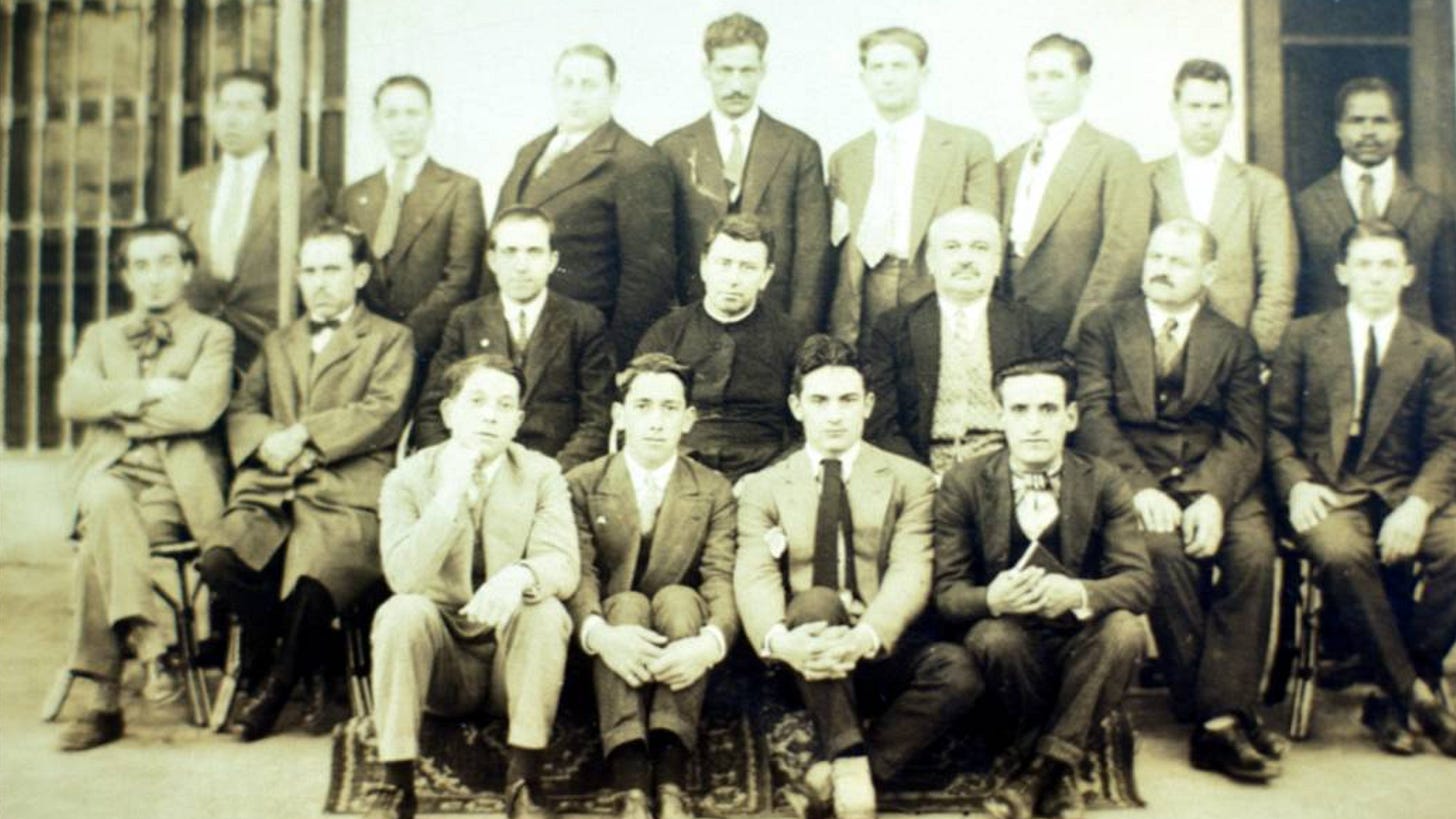
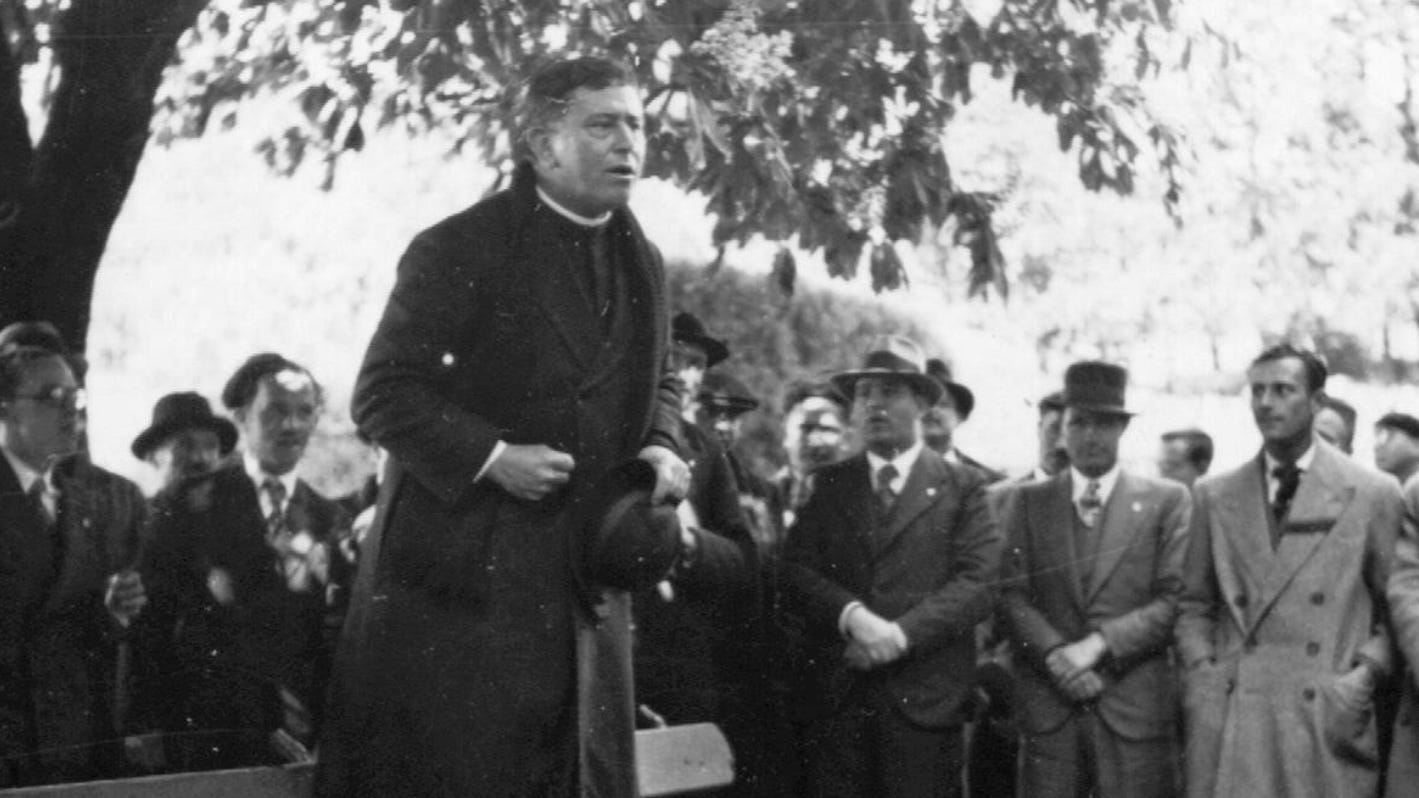
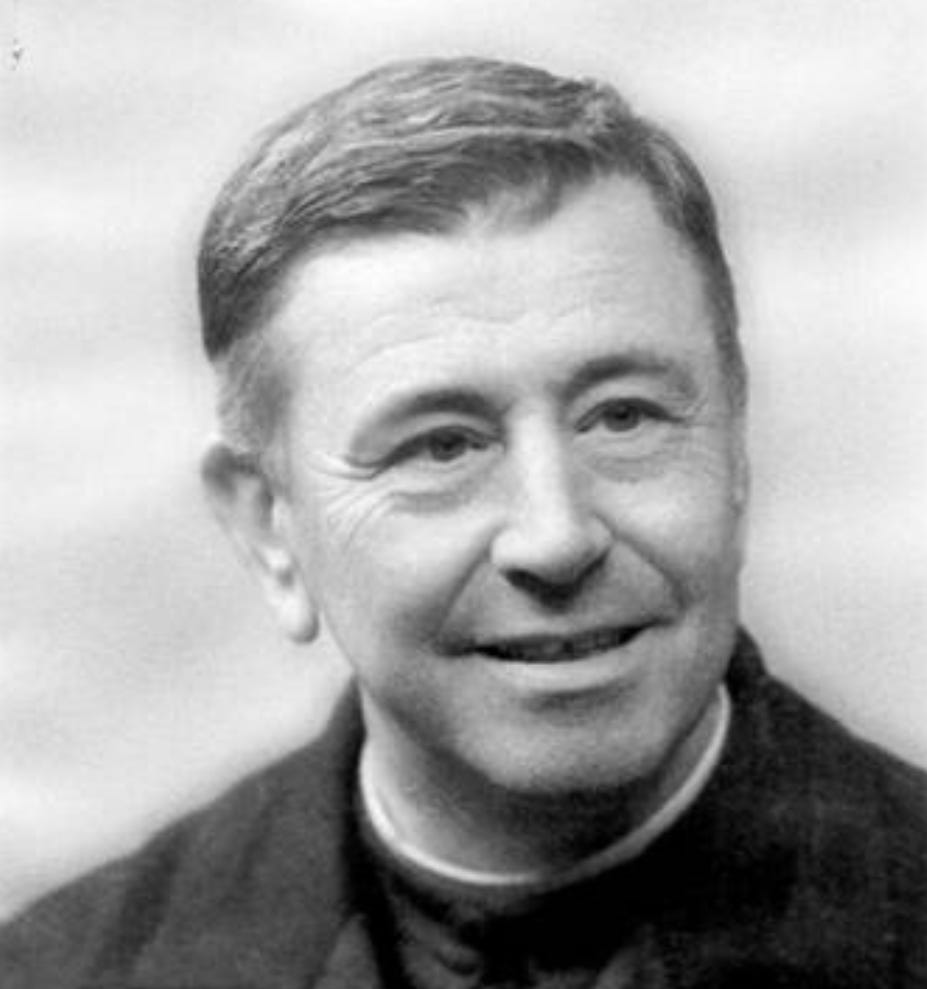



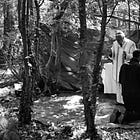
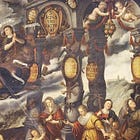
Very nice article about Fr. Valet and the great work he did with the five day Ignatian Spiritual Exercises.
Keep up the good (Godly) work!